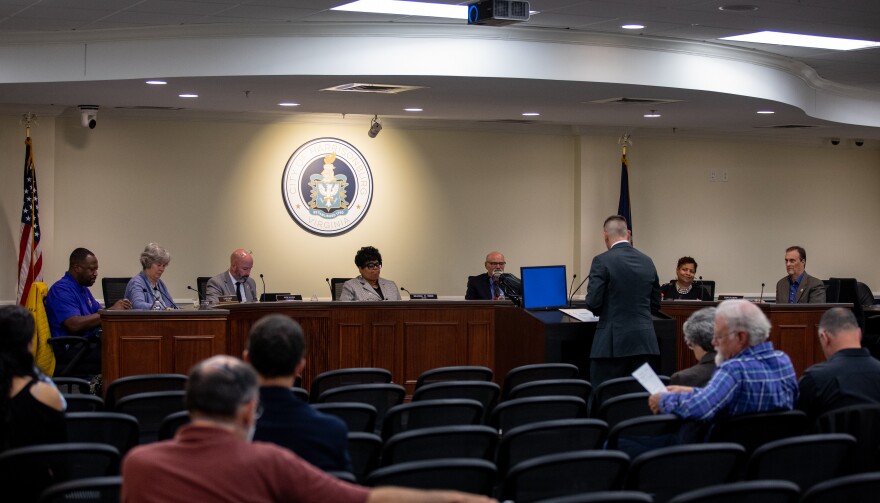Three Democrats and one independent candidate are vying for three open seats on the five-person Harrisonburg City Council in November.
After a decade-long tenure on the board, Chris Jones lost his primary bid in June.
Harrisonburg Mayor Deanna Reed, Vice Mayor Laura Dent and newcomer Nasser Alsaadun advanced out of the Democratic contest. (The mayor and vice mayor roles are selected by council from among members of the panel.) They join independent candidate Javier Calleja on the November ballot.
Like many other cities, Harrisonburg is facing some major issues, including a lack of affordable housing. Council has approved the development of nearly 3,000 residential units since 2021, but only 25 have been built; another 55 units are under construction. The lack of available land in the city and the inflation of building supply costs has exacerbated the problem.
“Harrisonburg is absolutely building more housing, but it’s about whether or not that housing is affordable,” said Bobbi Gentry, associate professor of political science at Bridgewater College. “One of the things the City Council has done this year is consider how to spend COVID-19 relief funds from the federal government, issued by the state, to provide more affordable housing.”
Council has made housing a focus, including it as one of the seven tenets of Harrisonburg 2043, according to city spokesman Michael Parks. The city's also hired a housing co-ordinator and is currently studying how two city-owned properties might be used to address Harrisonburg’s housing needs.
Alsaadun is a former interpreter for the U.S. Army. He moved from his native Iraq as a refugee in 2008 and settled in Harrisonburg. If elected, he would be the first refugee to serve on the council.
The candidate said he’s primarily focused on three issues: housing, education and climate action.
“Affordable housing is a crisis, and we need more sustainable, creative solutions to provide homes for all income levels,” Alsaadun said. “I also believe we must continue to support our local schools, ensuring they are well-funded and equipped to handle the needs of our diverse student population.”

Calleja, also new to politics, is a Spanish professor at James Madison University. He arrived in the U.S. from Uruguay at the age of 18, and experienced homelessness during his first few months in the states while teaching himself English and working his way through Eastern Mennonite University.
He's running on a platform to prevent tax increases while investing in education, infrastructure and public safety.
“People are concerned about the tax increases they have experienced over time,” Calleja said. “They don’t see any relief in sight. When the taxes continue to be raised, whether justifiable or not, it is making it very hard for homeowners to stay in town, especially when they can cross the city line and pay less in property taxes.”
If elected, Calleja would be the second immigrant to serve on the council. Sal Romero, who immigrated from Mexico, served on City Council from 2018 to 2022.
Reed was first elected in 2016 and has served as Harrisonburg’s mayor since 2019. Under her leadership, Harrisonburg built its second high school, Rocktown High School, which opened this fall.
She also oversaw the construction of the city’s first low-barrier, year-round shelter for people experiencing homelessness. The city used funds from the American Rescue Plan Act to build the shelter, which is tentatively set to open in November.
If re-elected, Reed said she will continue to prioritize pay and benefits for city staff. Council recently approved paid parental leave for city employees.
“I will prioritize transportation by improving our routes and extending hours, and I will continue to work toward affordable housing and childcare,” Reed said.
Dent was elected in 2020 and is in her second year as vice mayor. She has focused on environmental sustainability, pushing for solar panels on government buildings and advocating for affordable housing. Dent was also the force behind the city’s Gaza ceasefire resolution — the first approved in Virginia.
If re-elected, Dent promised to continue working on climate initiatives.
“I’ll keep up the good work in climate action, implementing the plans we’ve set in motion, such as solar panels on Turner Pavilion and community participation in meeting our carbon-reduction goals,” Dent said.
The election likely will further diversify an already diverse council and represent more of the city’s unique population. Harrisonburg is a refugee resettlement city, and current council members are the most diverse in the city’s history: a majority-Black and majority-women council, led by a female mayor and vice mayor.
Gentry, the Bridgewater College professor, said having various perspectives on council that represent Harrisonburg’s population is vital.
“It is democracy at its finest,” Gentry said. “So few people — less than 2% of the American public — actually run for elected office. The value and importance of multiple perspectives … is essential.”
Gentry — who also runs BC Votes, an organization dedicated to educating students on voting — said that while the presidential election is important, local elections can make the most difference.
“The decisions that impact our everyday lives — the people that change the rules, the people that listen to us about potholes, snow removal or how we are educating our children — are made at the local level,” Gentry said. “These elections are essential to what we are doing in this American democracy.”












